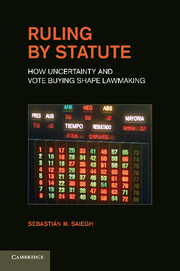Book contents
- Frontmatter
- Contents
- List of Figures
- List of Tables
- Acknowledgments
- PART I INTRODUCTION
- PART II THEORETICAL FOUNDATIONS
- PART III EMPIRICAL IMPLICATIONS
- 4 Measuring Chief Executives' Statutory Performance
- 5 Patterns of Statutory Policy Making Around the World
- 6 Political Prowess or “Lady Luck”?
- 7 Buying Legislators
- 8 Electoral Rules and Lawmaking
- PART IV NORMATIVE IMPLICATIONS
- PART V CONCLUSIONS
- PART VI APPENDICES
- Bibliography
- Index
6 - Political Prowess or “Lady Luck”?
Published online by Cambridge University Press: 03 May 2011
- Frontmatter
- Contents
- List of Figures
- List of Tables
- Acknowledgments
- PART I INTRODUCTION
- PART II THEORETICAL FOUNDATIONS
- PART III EMPIRICAL IMPLICATIONS
- 4 Measuring Chief Executives' Statutory Performance
- 5 Patterns of Statutory Policy Making Around the World
- 6 Political Prowess or “Lady Luck”?
- 7 Buying Legislators
- 8 Electoral Rules and Lawmaking
- PART IV NORMATIVE IMPLICATIONS
- PART V CONCLUSIONS
- PART VI APPENDICES
- Bibliography
- Index
Summary
Pelé or Maradona. Who was the better of the two? In the summer of 2000, the world soccer governing board, the Fédération Internationale de Football Association (FIFA), held an online poll to elect the Player of the Century. Maradona scored a resounding victory, obtaining 53.6 percent of the vote compared to 18.5 percent for Pelé. FIFA hastily set up another jury composed by its own officials to hand out another Player of the Century award, which, unsurprisingly, went to Pelé.
Regardless of FIFA's dubious practices, judging the worth of individual athletes is always a controversial matter. Similarly, ranking the performance of individual chief executives is a tricky affair. Statements such as “chancellor x is an effective ruler” or “president y is ineffective” are pervasive in both the scholarly and popular literatures. To assess “how well” or “how poorly” a chief executive performs as a lawmaker, however, one should have some reasonable expectation about how that particular chief executive should be doing.
The evidence presented in the previous chapter suggests that the comparative ability of chief executives to rule by statute depends to a great extent on circumstances that are not fully under their control. In this chapter, I take the analysis one step forward by examining the individual performance of chief executives once several contextual factors are taken into account. I focus specifically on chief executives' partisan support in the legislature, as well as other characteristics of their countries (such as constitutional structures, sociopolitical heterogeneity, culture, and history).
- Type
- Chapter
- Information
- Ruling by StatuteHow Uncertainty and Vote Buying Shape Lawmaking, pp. 95 - 113Publisher: Cambridge University PressPrint publication year: 2011



